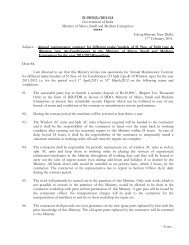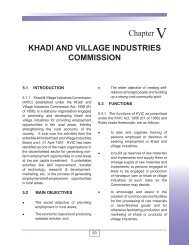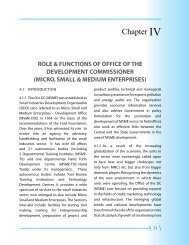Evaluation Study MSE Cluster Development - Ministry of Micro ...
Evaluation Study MSE Cluster Development - Ministry of Micro ...
Evaluation Study MSE Cluster Development - Ministry of Micro ...
You also want an ePaper? Increase the reach of your titles
YUMPU automatically turns print PDFs into web optimized ePapers that Google loves.
Chapter No: 4 – S<strong>of</strong>t Interventions in Sampled <strong>Cluster</strong>sCHAPTER4SOFT INTERVENTIONS IN THESAMPLED CLUSTERS4.1 Introduction“S<strong>of</strong>t Interventions”, as they are most inappropriately termed are not ‘s<strong>of</strong>t’ at all as theterm may imply. They are vital trust building measures undertaken to promotecooperation among individual cluster units. These measures are intended to bringcluster units together on a common platform by making them realise their collectivestrengths as compared to their strengths as individuals units.These measures are aimed at providing a spark or a critical inducement, to catalyzecollective action and to unravel the enormous latent power <strong>of</strong> cooperation that can leadto concrete individual benefits. The measures cement the bonds between individual unitsand bring them on to a common platform, strengthening their resolve to act together,and to unleash their collective strength. As such they are the basic and preparatorysteps which are most essential to create the conditions for the successful implementation<strong>of</strong> the <strong>Cluster</strong> <strong>Development</strong> Programme. These measures are aimed at building a strongconsensus around a feasible and well-designed action plan to strengthen the cluster, withthe support <strong>of</strong> the state.The nature <strong>of</strong> the clusters differs widely in terms <strong>of</strong> their input requirements, outputs,production processes, as well as developmental stages. In some cases they may bealready evolved and active while in other cases they may be less evolved, passive, andinert. The size and scale <strong>of</strong> activities and the degree <strong>of</strong> development are importantdifferentiators and as such the problems that they confront may be substantially differentin each case. Moreover, first generation small entrepreneurs in new businesses who arelikely to be more educated and progressive in their outlook, would require to bemobilised and motivated for collective action. A different approach would have to befollowed, and a different support system would have to be provided to them, ascompared to others who have evolved in the activity over many generations.Similarly, existing <strong>MSE</strong>s require different services at different stages <strong>of</strong> their growth,especially those that relate to modernisation and up-gradation <strong>of</strong> production processes,additional financing, new markets, etc. Additionally, <strong>MSE</strong>s are likely to have sectorspecific requirements. The s<strong>of</strong>t interventions have to take into account all theseparameters while designing the action plan for such interventions.The <strong>Cluster</strong> <strong>Development</strong> Executive acts as a guiding force in the planning andimplementation <strong>of</strong> s<strong>of</strong>t interventions. The roadmap for s<strong>of</strong>t interventions is laid duringthe preparation <strong>of</strong> the diagnostic study itself. The diagnostic study must also identifythe needs <strong>of</strong> the cluster actors, as well as their common aspirations. Thecomprehensiveness <strong>of</strong> the diagnostic exercise helps in correctly identifying the commonneeds, that when articulated through an action plan, assists in building trust andcohesiveness.77
















